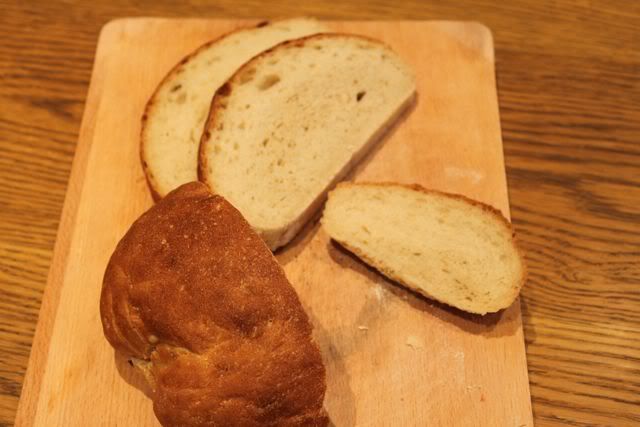Yesterday I made a French Bread dough using pate fermentee. I followed Peter Reinhart's master formula 2 for French bread. Mixed the dough, allowed it to proof for 30 mins (just to start swelling), punched down, then allowed a 90 minute rise. Then I formed 3 rounds.
The first I left out for another 30 mins or so and baked last night without retarding.

Crust wasn't super-crunchy, but the inside was very lovely, creamy, with tight but irregular holes and a nice airiness.
The other two I put in the fridge overnight for retarding. Unthinkingly, I covered with a cloth, so by this morning they had a bit of a dry skin. When it came to slashing, they deflated a bit. Not much oven spring either:

I'm wondering: am I using too much yeast for successful retardation? Why am I getting a collapsing loaf after 1 night's retarding in fridge? Any ideas?
Thanks
Lisa
Those are prime indicators of the loaves having overproofed during their time in the refrigerator. Whether the refrigerator was "too warm" for the length of time the loaves retarded, or the time was "too long" for the temperature in the refrigerator doesn't really matter. The combination of the temperature and the time in the refrigerator resulted in dough that had overproofed.
Yes, yeast quantity has a bearing, but a really cold refrigerator will slow fermentation down to a snail's pace while a warmer one doesn't slow it as much as expected/desired. Size and shape of the dough mass also has a bearing, in that a large mass with a large cross section will take longer to cool all the way to the center than will a smaller mass with a small cross section. The dough temperature at the time it is put into the refrigerator also has an effect, with warmer doughs taking longer to cool down than cooler doughs.
Future attempts will get better as you learn how those different factors intersect. Keep notes; it speeds up the learning process. You will eventually be able to retard your doughs without much conscious thought, based on your experience.
Paul